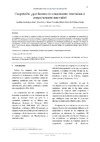Please use this identifier to cite or link to this item:
http://hdl.handle.net/10553/70515
| DC Field | Value | Language |
|---|---|---|
| dc.contributor.author | Santolaya Sanz, Josefina | en_US |
| dc.contributor.author | Mora Valentín, Eva María | en_US |
| dc.contributor.author | Ortiz de Urbina, Marta | en_US |
| dc.date.accessioned | 2020-02-26T18:23:19Z | - |
| dc.date.available | 2020-02-26T18:23:19Z | - |
| dc.date.issued | 2019 | en_US |
| dc.identifier.issn | 2530-5603 | en_US |
| dc.identifier.uri | http://hdl.handle.net/10553/70515 | - |
| dc.description.abstract | El objetivo de este trabajo es analizar el efecto que tienen la capacidad de absorción, los mecanismos de apropiación, la proximidad de recursos y el “sticky knowledge” en la propensión a innovar en coopetición. Para ello, se ha propuesto un modelo de análisis y se ha testado en una muestra de 526 empresas españolas que cooperan con competidores. Los resultados obtenidos muestran una influencia positiva de los mecanismos de apropiación, la proximidad tecnológica de mercado y el número de investigadores en I+D, en el comportamiento innovador. También se observa un efecto negativo de proximidad cognitiva y social, y así como de algunos componentes de la capacidad de absorción (flujos de conocimiento externo, gasto en I+D y formación). | en_US |
| dc.description.abstract | The purpose of this paper is to analyze how knowledge factors as absorptive capacity, appropriability mechanisms, proximities and sticky knowledge determine the propensity to innovate in coopetition. We test the hypotheses by using a sample of 526 Spanish firms that cooperate with competitors, and performing a logistic binomial regression to analyze the impact of each factor. The findings show a positive influence of appropriability mechanisms, market proximity and the number of R&D researchers on innovative behaviour. It is also observed a negative effect of cognitive and social proximity and some factors of the absorption capacity (knowledge flows, expenditure on R&D and training). | en_US |
| dc.language | spa | en_US |
| dc.relation.ispartof | Emprendimiento y negocios internacionales | en_US |
| dc.source | Emprendimiento y negocios internacionales [ISSN 2530-5603], v. 4 (2), p. 25-40 | en_US |
| dc.subject | 5311 Organización y dirección de empresas | en_US |
| dc.subject.other | Coopetición | en_US |
| dc.subject.other | Conocimiento | en_US |
| dc.subject.other | Acuerdos de coopetición | en_US |
| dc.subject.other | Comportamiento innovador | en_US |
| dc.subject.other | Entrepreneurship | en_US |
| dc.subject.other | Social media | en_US |
| dc.subject.other | Text mining | en_US |
| dc.subject.other | Data-driven | en_US |
| dc.subject.other | Thematic analysis | en_US |
| dc.title | Coopetición: ¿qué factores de conocimiento determinan el comportamiento innovador? | en_US |
| dc.title.alternative | Managing knowledge factors for innovating in coopetition | en_US |
| dc.type | info:eu-repo/semantics/article | en_US |
| dc.type | Article | en_US |
| dc.identifier.doi | 10.20420/eni.2019.295 | en_US |
| dc.identifier.issue | 2 | - |
| dc.relation.volume | 4 | - |
| dc.investigacion | Ciencias Sociales y Jurídicas | en_US |
| dc.type2 | Artículo | en_US |
| dc.description.notas | Clasificación JEL: M1, O3, O32 | en_US |
| dc.utils.revision | No | en_US |
| dc.identifier.ulpgc | Sí | es |
| item.grantfulltext | open | - |
| item.fulltext | Con texto completo | - |
| Appears in Collections: | Artículos | |
Items in accedaCRIS are protected by copyright, with all rights reserved, unless otherwise indicated.
